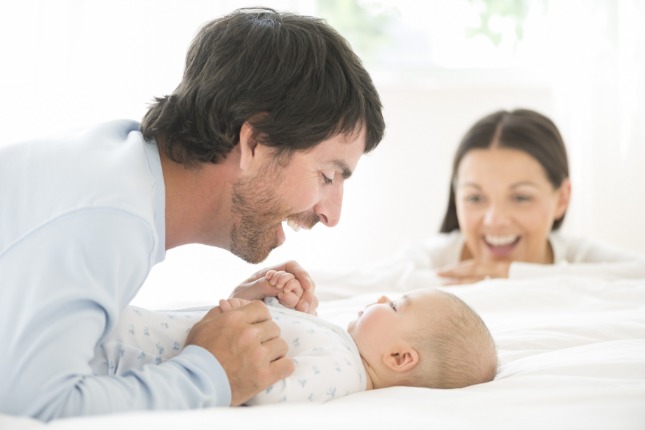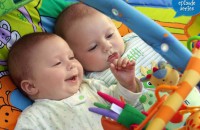Natalie Gross 0:09
They say one of the best things you can do as a new parent is talk to your baby. But what do you say exactly? And am I the only one who feels awkward talking to someone who's not talking back? On today's show? We're talking about ways that you can communicate with your baby that actually helped them learn valuable communication skills. So get those high pitched mommy voices warmed up, or don't and get ready to hear some helpful insights. This is Newbies.
Natalie Gross 0:42
Welcome to Newbies. Newbies is your online on the go support group guiding new mothers through their baby's first year. I'm Natalie Gross mom to a three year old boy and a brand new baby girl. We've got a great show talking about communicating with your baby. Now if you haven't already, be sure to visit our website, it's new mommy media.com And subscribe to our weekly newsletter, which keeps you updated on all the episodes that we release each week. Another great way to stay updated is to hit that subscribe button in your podcast app. And if you're looking for a way to get even more involved with our show, then check out our membership club called Mighty moms. That's where we chat more about the topics discussed here on the show. And it's also an easy way to learn about our recording so that you can join us live. We have moms Melissa and soltana joining us today. Welcome to the show Mama's and as we get started here, tell us a little bit about you, your family and where you're located.
Sultana Karim 2:00
Hi, my name is Sultana. I am a mom to a four or soon to be four year old and we are located in Woodbridge, Virginia.
Natalie Gross 2:08
Welcome to the show.
Melissa Bradstreet 2:09
I am Melissa. I'm a mom of three I have a seven year old son, a almost five year old daughter. And then my youngest daughter is three. And we just recently relocated in the last year back to Northwest Indiana, which is my home state and home area.
Natalie Gross 2:24
Awesome. Thank you so much for being on the show. Today. We're talking about communicating with babies. So how would you describe the way that you communicated with your kids? And those early baby days? Did you do a lot of talking reading sign language? All of the above?
Sultana Karim 2:41
Yeah, I agree. I did a lot of talking to my daughter, even though it's like she didn't really respond back, which was awkward. But like it was helpful for me. In the long run was helpful for her. As I continue to talk to her and read books to her. I learned baby sign language and then taught her when she was older how to do it so that we could communicate until she had the skills to be able to say the words.
Natalie Gross 3:08
Great. Yeah, that's what we did in our house to Melissa, what about you?
Melissa Bradstreet 3:12
I love hearing that about the sign language especially because my first born was we use a little bit of baby sign language with him. But it became very important when my second board came along because she was born deaf. And so we got that diagnosis. That's definitely we're going to ramp up the sign language, just giving her another tool to communicate before she ended up going to the cochlear implant route. Before she got those giving her an additional tool to help us communicate with her help her communicate with us and with those around her. I also found that the reading even just like while I was feeding my baby just reading a book to them. Just getting that verbal input out there for them. They might look at you funny but they are listening.
Natalie Gross 3:56
Yeah, my daughter just turned three months old. And I've started to notice to Stephen in the last week how much she really kind of locks in on books when I read to her and they changed so quickly and it's really cool. When did you feel like your baby actually started communicating back to you
Melissa Bradstreet 4:13
Communicating was looking at me.
Sultana Karim 4:16
And making facial reactions like sometimes there's a smile. Other times it's just like a stare.
Natalie Gross 4:22
Yeah. Well thank you so much for sharing your experiences. We are going to take a quick break and when we come back we'll be meeting our expert speech therapist and parent coach Gabriele Nicolet.
Natalie Gross 4:43
Today on Newbies, we're talking about the best ways to communicate with your baby. Our expert is Gabriele Nicolet. She is the head toddler whisperer at speech kids a private online speech therapy practice and the co founder of raising orchid kids which is a parent education and coaching practice gap Well, welcome to newbies. Thanks so much for being here. I'm delighted. Thank you for having me. Yeah, of course. So I mentioned at the beginning of this episode that we so often hear how good it is to talk to our babies. So can you explain why that is? And how much do they really understand?
Gabriele Nicolet 5:17
The short answer is they don't understand any of it initially. But there are some really good research on babies actually, even in utero, recognizing and preferring, they're mostly mothers, but any familiar voice. And so they do these suck studies where they, they plug the baby with a pacifier, and then they play a voice. And they measure the rate of sucking. And it increases dramatically when babies hear their Mother's Voices, which tells us that they are recognizing it. And so that happens in utero. And it continues, obviously, after they're born. The other really interesting studies have to do with specific languages and sort of this notion that babies at a very, very young age, under a year old are already recognizing which sounds belong to their language, and which sounds do not and the brain is really active in pruning, access to sounds that they don't need. If they're, for example, a monolingual. English speaker we don't need a Spanish are. And if they are bilingual, Spanish English, then you do and so bilingual brains will keep that Spanish are but monolingual English brains will not. And so that's some really interesting kind of research. And then, you know, as soltana, and Melissa just described, babies as young as six weeks are starting to smile socially. And that's really where communication starts, right? When they smile at you, you smile at them. It's just a cycle of loveliness.
Natalie Gross 6:58
That is so interesting that you mentioned the language thing, because you're right. I mean, babies from before they can even talk are learning English, if that's the primary language at home, can even learn you know, two languages, three languages, if that's what their parents are teaching them. I've, this might sound crazy, but I've even heard that some babies can communicate telepathically with each other or with their moms. But basically, they just have much better communication skills than I think we give them credit for. Is that true?
Gabriele Nicolet 7:28
Yeah. So we pay it particularly in modern culture, maybe in Western culture, too. We pay a lot of attention to talking as communication. But communication is a far more complex and far more nuanced experience than just the words that we're saying. So in that regard, yeah, babies and moms are telepathic. Right? Moms of babies are often able to really tune into their child's needs. And often the baby is also tuning into tuning into the mom. So if mom is stressed, baby's also stressed if mom is calm, babies also calm. This is where the term co regulation comes from. Right? CO regulation is a form of communication. It's, it's energetic, it's not verbal.
Natalie Gross 8:14
Yeah, that's interesting. How should we be talking to our babies shouldn't be using that, you know, high pitched baby talk voice or our regular voice, just like we're talking to a friend.
Gabriele Nicolet 8:25
So there is no one right way to talk to babies. You, moms and dads, parents should speak to your baby in the way that feels most comfortable for you. And if that means speaking another language than the majority language around you. So be it the language that you are a native speaker of and the way in which you speak in your culture, in your family in your life, whatever that is that feels most natural, is the one that's going to come with that energy that we were just talking about. That nonverbal extra. And so while there is some evidence to suggest that like this big tog when we talk to the big things, helps to highlight breaks in words or like highlight the kinds of sounds that we're using. And so like clinically, there's a reason that we use baby talk. It is absolutely not required.
Natalie Gross 9:29
That was a solid, baby talk boys.
Gabriele Nicolet 9:33
Lots of practice, as you might imagine.
Natalie Gross 9:36
What are some strategies for communicating with our babies in ways that actually helped build that speech language, those cognitive skills?
Gabriele Nicolet 9:44
So I love to remind parents about this. I like to laugh because I'm like the speech therapist who tells everybody to stop talking so much. Build the communication that nonverbal communication first, right so babies have who are like six Week sign up, are actually engaged in turn taking, as in the thing that will become eventually conversational turn taking, right. And so one of the best ways to build conversational skills in your infant is to play something that I like to call The Imitation Game. So basically, your child makes a noise or a face, and then you make that same noise or face, what happens is because of mirror neurons, your child's going to do the same thing back. And it's just, it's really fun. It is an energetic positive exchange. And we know that learning happens when things are fun and positive. And so that is a delightful little conversation that you can have. The other thing that can help babies build language and thinking skills, and cognitive skills and learn concepts and all those things, is to talk about what's happening in the immediate environment around them. So like, lots of parenting advice is like, talk to your baby all the time. And parents are like, why? I'm so confused. It's not really benefiting kids to just talk in their presence. The point is it connecting the words with the child's experience, right? So it's like, edited audio description of what the what is happening to them. So if you're changing a diaper, you're gonna say, on changing your diaper, right. And, of course, an infant doesn't understand those words. But over time, number one, they will and number two, they're recognizing that tone. They're recognizing this the predictable sequence of events. And so we're setting up sort of a positive environment again, when things are fun and positive, we learn. And so that's when when people say should I talk to my baby? It's like, well, yes, but, you know, we're talking to them about the immediate environment here.
Natalie Gross 12:04
What are the speech milestones for babies under one?
Gabriele Nicolet 12:08
Okay, we're gonna go in order here, from birth to three months of age, we're basically talking about getting used to being in a body so we're grunting, we're crying, reciting. It's pretty much it. Sort of, we call them vegetative sounds, or farting, or burping all of that. The Essentials, the essentials, exactly, which, which go on quite a long time if you have boys. By about four months of age is when we start to hear exploration of what we call the vocal tract. So like, your, your lungs, your throat, your mouth, and that's where we hear like raspberries. Right? Or squealing or shouting, no, no. And maybe some single syllable babbling when we get to about six months old. So my mom, my mom, my dad, baba, baba, kind of stuff. Around six months of age, that babbling is getting more complex. Now we're getting mama bull boy Dida kinds of strings, and they're getting longer. So different vowels, different consonants connected. I think six months is kind of where it starts to get fun. But nine months is really where it really gets interesting, because you're gonna have kids who sound like they're talking, and they sure aren't. But I know enough and enough. Ah, that's called jargon Ng, which is like, they're very intent on what they are telling you. It clearly has some meaning to them. And it has no bearing in any real language, but it is communication. And so the fun thing at that age is to respond as if you understand exactly what's happening. It was a clip going around the internet not too long ago about with his dad and the toddler sitting on the couch watching sports. And the back and forth between them if you if you google it on whatever YouTube but what routes the board is, but it is this gorgeous exchange where toddlers babbling? Dad is responding as if he's making sense. It's absolutely priceless.
Natalie Gross 14:12
I'll have to check that out. That's awesome. Yeah,
Gabriele Nicolet 14:14
It is really good. So by about one year of age, if everything's going well, then we expect children to be starting to use single words in order to communicate a range of wants, needs, ideas, questions. And so what that looks like, is a baby who smiles and says mama, as in Mommy's home, when they see their mom come home and adore. And the same baby who says, Hola, as in Mom, come back, right? So we're using the same word. But we're we're using that word for a lot of different what we call communicative functions and a lot of different reasons. And when this is going well, it looks effortless. It looks so easy for them. And when it's not, it's obvious. And so as a speech therapist, I'm gonna put my plug in here where if you have concerns and children are not progressing through these stages, as I've described them, and it looks hard for them. act early, early is better.
Natalie Gross 15:23
I'm glad you mentioned that. Many parents choose to use baby sign language, we've kind of already talked about that a little bit, especially for the early days before babies can talk. So how can that be helpful? And I'm curious if the signs like if they can sign milk or more, do these counters words for milestone purposes?
Gabriele Nicolet 15:42
They absolutely count. Yes, particularly if they're recognizable to caregivers. And kids, as young as old as about nine months of age can start signing, which by the way, that's when kids start waving, right high end by at about nine months, 9-10 months. And so that's when kids can start using their hands for communication, which is essentially what we're doing when we're waving. And so yeah, signs count for words. And Sign Language is a huge benefit for, for babies. Because of that three month gap between nine and 12 months, that is an age where kids know what they want to say. But they don't have a word to say it yet, because they're poor little mouths just haven't caught up yet. And I like to say speech is kind of like the ultimate fine motor activity, meaning very small muscles in a very small space. And your hands are much bigger muscles. And so the you know, the sign for milk is sort of to squeeze your hand as if you're milking an utter, that is a much easier thing to do a much easier motion to make, than to say the word and the sounds milk, right. And so, but kids absolutely know what milk is. And so when you've got this gap between what they know, and what they're able to do motorically. In other words, with their bodies, science can can really bridge that gap. And certainly for anybody with a communication issue, anybody who's deaf, anybody who is going to be a late talker, because they've got some muscle related issues, sign language can also be a really important bridge in their communication journey.
Natalie Gross 17:36
Great. Well, thank you so much for sharing that. Gabriele. We're going to take another quick break. And when we come back, we're going to bring back our moms into the conversation. So stay tuned.
Natalie Gross 17:50
Alright, mamas. Any thoughts on what we just heard from Gabriele?
Melissa Bradstreet 17:55
I would say I love how Gabriele mentioned about the preference of a familiar voice that children are able to exhibit at such an early age that just warmed my mama heart.
Natalie Gross 18:05
Yeah, for sure. That's really awesome. Sultana, any thoughts?
Sultana Karim 18:10
I appreciate a couple of things. One that when Gabriele was talking about in vitro of like babies, recognizing whoever's carrying them. And then how it is displayed after once the baby is born. And then when you're just recently talking about the baby sign in between that the six months and nine month period, and then when they get older, of how important it is to like to keep how they're communicating. And then like how their muscles are not fully developed yet. And it makes sense, right of like, they're able to grasp things, they able to move around a lot better than kind of like actually speaking. So it's pretty, uh, thank you for sharing that validated like, oh, yeah, that makes sense. When my daughter was smaller. Yeah.
Natalie Gross 18:57
Moms, so you know, we were kind of talking about some of the strategies of how you can talk to your kid. And I know we touched on it a little bit at the beginning, but what advice would you give to other moms on some strategies they can use to help build that speech, cognitive development,
Melissa Bradstreet 19:12
narration is such a helpful tool, like Gabrielle said, and that's probably something that is easiest for a mom who's unsure of how to incorporate that into her day. Just tell the child about what you're doing.
Sultana Karim 19:27
Yeah, and don't stress about like trying to learn, like all these different nuances and motherhood and just take it at your own pace because you don't have to be an expert or be perfect at it.
Melissa Bradstreet 19:40
If you have a question, go to a speech therapist. They are there to help. I have personal experiences several and they're fantastic.
Natalie Gross 19:48
I'm sure Gabriele love that plug.
Gabriele Nicolet 19:50
I am loving you so much right now. Thank you.
Natalie Gross 19:54
Gabriele, any last thoughts before we wrap up?
Gabriele Nicolet 19:57
I think your mamas are amazing. I am So happy to have been here with them. Their perspective is so just like comforting and wonderful. And I just appreciate, you know, the spirit with which this this podcast helps parents who are just going through, you know, a big change that can feel overwhelming at times and it doesn't have to we just give ourselves some grace, and we go through it.
Natalie Gross 20:25
Well, I love to hear that. So, thank you Gabriele so much for being here and moms soltana And Melissa as well. You can find out more about Gabriele at speechkids.com And be sure to check out new mommymedia.com where we have all of our podcast episodes plus videos and more.
Natalie Gross 20:52
That wraps up our show for today. We appreciate you listening to Newbies. Don't forget to check out our sister shows Preggie Pals for expecting parents, Parent Savers for moms and dads with toddlers, the Boob Group for moms who get breast milk to their babies, and twin talks for parents of multiples. Thanks for listening to Newbies, your go to source for new moms and new babies.
Disclaimer 21:17
This has been a New Mommy Media production. Information and material contained in this episode are presented for educational purposes only. Statements and opinions expressed in this episode are not necessarily those of new mommy media and should not be considered facts will such information and materials are believed to be accurate. It is not intended to replace or substitute for professional medical advice or care and should not be used for diagnosing or treating health care problem or disease or prescribing any medication. If you have questions or concerns regarding your physical or mental health, or the health of your baby, please seek assistance from a qualified health care provider.
Transcribed by https://otter.ai









